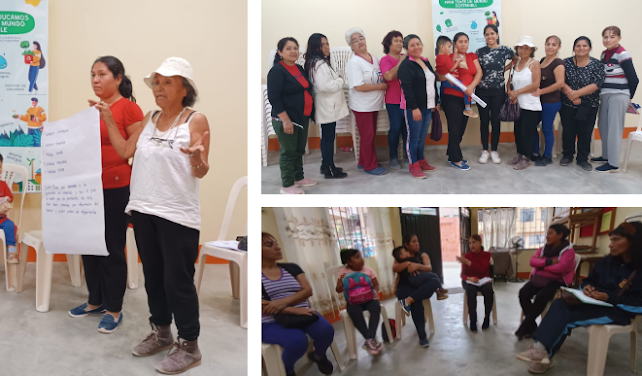Prevención de la violencia de género en Villa el Salvador
Se ha realizado un taller de prevención de violencia con las mujeres del comedor de Villa el Salvador. Han sido cuatro sesiones muy especiales en las cuales a través de un enfoque participativo, logramos reconocer los diversos tipos de violencia de género. Se utilizó la metodología de casos donde las participantes pudieron poner en práctica los conocimientos dialogados en la primera parte del taller para identificar los tipos de violencia y proponer alternativas de acción.
Durante las sesiones las participantes expresaron sus opiniones y experiencias aportando mucho al compartir de los conceptos. Por ejemplo, el concepto de violencia se desarrolló a partir de una lluvia de ideas, de esa manera se pudo ir construyendo características claves del concepto desde sus vivencias y de lo que observaban en su comunidad, haciendo el aprendizaje mucho más significativo.
También se reconoció que para algunas participantes fue difícil identificar los tipos de violencia más sutiles como la manipulación, el acoso sexual o los micromachismos coercitivos y encubiertos, ya que, son formas en las que la violencia ha sido naturalizada y normalizada en los contextos de la comunidad.
El taller fue un espacio para problematizar lo que entendemos por violencia y generar un espacio de sensibilización. También se brindó información con respecto a las instituciones que brindan apoyo legal y psicológico frente a una situación de violencia. Así mismo, lo que más me agradó de esta experiencia es la capacidad de las participantes en cuestionarse sus propios conceptos y experiencias.
A violence prevention workshop was held with the women of the Villa El Salvador soup kitchen. There were four very special sessions in which, through a participatory approach, we were able to recognize the different types of gender violence. We used the case methodology where the participants were able to put into practice the knowledge discussed in the first part of the workshop to identify the types of violence and propose alternatives for action.
During the sessions, the participants expressed their opinions and experiences, contributing greatly to the sharing of concepts. For example, the concept of violence was developed through a brainstorming session, which allowed them to build key characteristics of the concept based on their experiences and what they observed in their community, making the learning process much more meaningful.
It was also recognized that for some participants it was difficult to identify the more subtle types of violence such as manipulation, sexual harassment or coercive and covert micromale chauvinism, since these are forms in which violence has been naturalized and normalized in community contexts.
The workshop was a space to problematize what we understand by violence and to generate a space for awareness-raising. Information was also provided regarding the institutions that provide legal and psychological support in the face of a situation of violence. Also, about this experience, I like it better that they were able to question their own concepts and experiences.

.jpeg)
Comentarios
Publicar un comentario